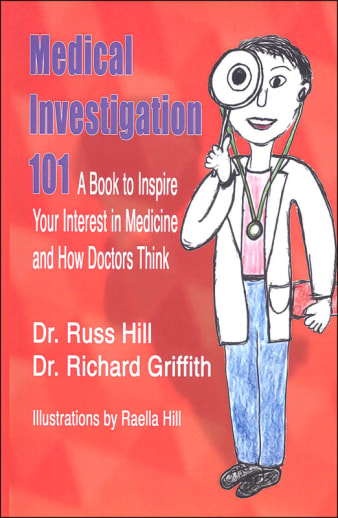Medical Investigation 101 invites students to try out a career in medical science. They learn about medical specialties and the wide array of healthcare team careers. They try their hand at solving the sort of medical mysteries doctors confront each day. Students learn some basic medical terminology and they discover how doctors analyze and solve medical puzzles. Students play the role of the physician as they read the realistic case histories and learn about the applicable physiology and pathophysiology. They complete interactive activities in each lesson to enhance information retrieval. These medical investigations stress a methodical way of thinking applicable to a wide array of decision making in life. Finally, the authors introduce current concepts in gene editing and medical therapy that promise the emergency of new frontiers in health science careers for today's students. Together, Drs. Hill and Griffith, share with their readers over fifty years of medical and teaching experience. Actual students have tested these lessons and endorsed the experience with remarkable enthusiasm. Students from middle grades, high school, and college should find the information useful as they learn about and assess their interest in healthcare related careers. The current trend in education has put a focus on career readiness, and yet we have not seen a textbook that introduces students to medically-oriented careers. This book tries to do just that by providing insights into how doctors analyze problems and conduct medical investigations. Whether students end up with a medically oriented career or not, the analytical skills required of physicians have applications in almost all careers we expect to see opening up in the future. Besides, It never hurts to have some basic medical knowledge tucked away when collaborating with a physician to maintain your own good health.
Medical Investigation 101
Description
Take a deeper look at the human body and the detective work necessary to help people live healthy lives through this self-paced course that builds upon basic anatomy. Students are introduced to various health science careers and the medical diagnostic process: the chief complaint (reason for visit), medical history, body system review and the medical examination. They will also learn how to identify possible diseases and the analysis required to determine the correct diagnosis. The SOAP method of documentation is taught that helps organize thoughts to arrive at correct conclusions. Students are presented with numerous medical investigations covering most body systems and common health issues including diabetes, food poisoning, viruses and bacteria, and emergencies. As a former RN, I found this to be an engaging and fun course that provides an excellent introduction to understanding the process of identifying a person's presenting symptoms and critical thinking skills necessary for arriving at an accurate conclusion.
| Product Format: | Paperback |
|---|---|
| Grades: | 6-12 |
| Brand: | Dr. Russell Hill |
| Author: | Dr. Russ Hill & Dr. Richard Gr |
| ISBN: | 9781548505998 |
| Length in Inches: | 9 |
| Width in Inches: | 6 |
| Height in Inches: | 0.625 |
| Weight in Pounds: | 0.85 |

